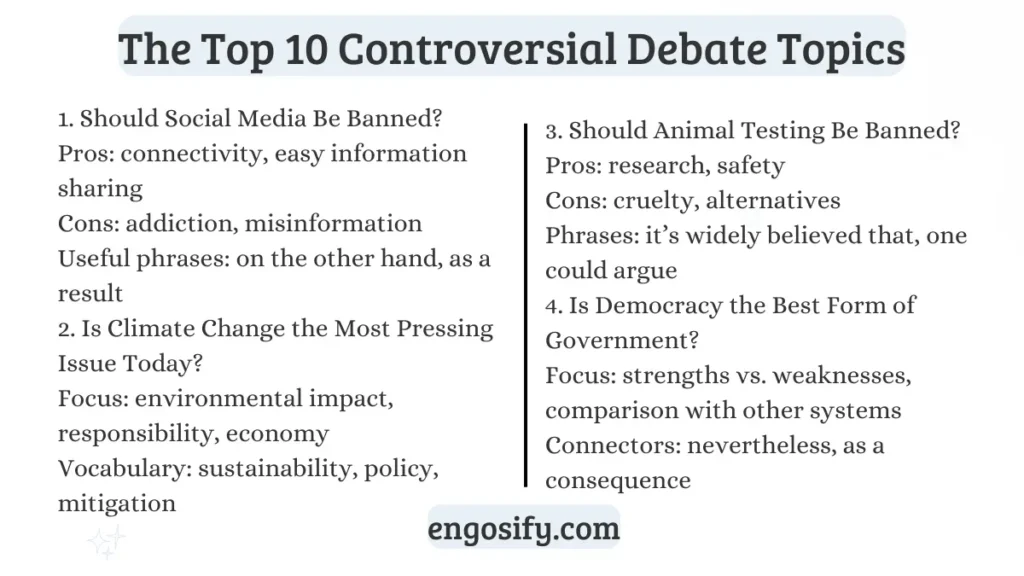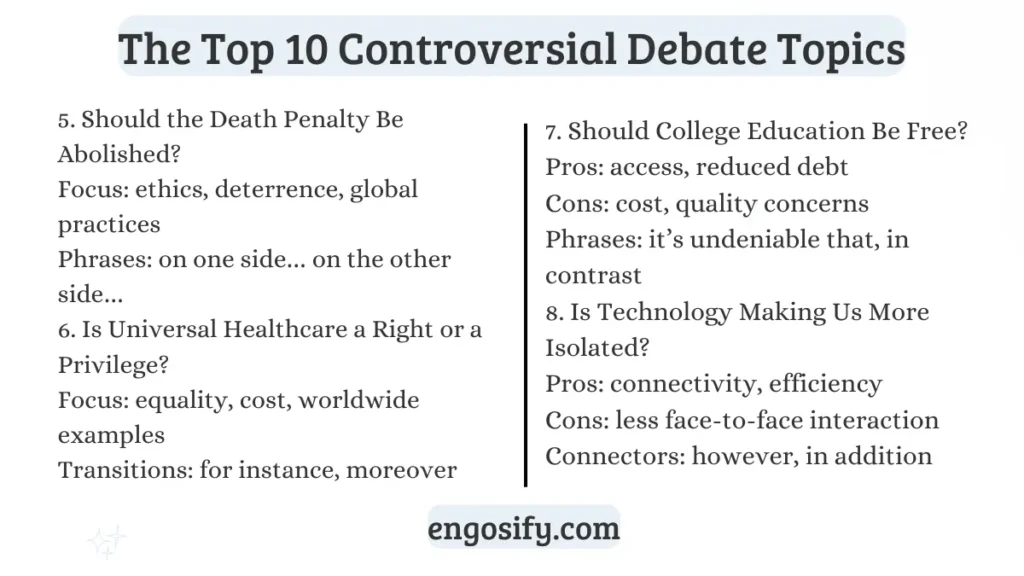Welcome to a space where English speaking skills meet lively conversation! If you’ve ever felt that learning English can be dry or repetitive, you’re in for a treat. Nothing sharpens your vocabulary, boosts confidence, and hones your critical thinking quite like debating controversial topics. This article dives into ten stimulating topics perfect for practicing your English, pushing you to think, articulate, and, most importantly, speak. Whether you’re an ESL student, a language enthusiast, or someone looking to brush up on public speaking in English, these topics will get your brain buzzing and your words flowing. So, buckle up, and let’s turn English practice into a fun, engaging, and occasionally fiery adventure!
Introduction
Welcome to the World of Debate
Have you ever noticed how people light up when discussing something they feel strongly about? That’s the magic of debate—it’s more than just words; it’s an exercise in reasoning, persuasion, and, yes, English communication skills. Jumping into debates lets you practice your vocabulary, sentence structure, and fluency in ways textbooks simply can’t. Plus, debating makes learning interactive. You get to argue, listen, counter, and explain, all in real-time. Exciting, right? And here’s a secret: it’s a safe space to make mistakes, learn, and grow.
Debates also naturally introduce you to idioms, transitional phrases, and connectors like however, on the other hand, or as a result, which can elevate your spoken English almost instantly. And if you’re a bit nervous, don’t worry—starting with structured topics helps you gradually build confidence while thinking on your feet.
Why Controversial Topics?
Now, you might ask, “Why not just discuss everyday topics?” Well, controversial topics spark deeper engagement. They make you defend your opinion, anticipate counterarguments, and explain your reasoning clearly. These topics are gold mines for practicing critical thinking exercises in English because they encourage you to analyze, articulate, and debate simultaneously. Whether it’s discussing universal healthcare, technology’s impact on society, or free college education, you’ll be stretching your mind and your English speaking muscles at the same time.
Moreover, controversial discussions often introduce advanced vocabulary naturally. You might find yourself using words like ethics, policy, regulation, or sustainability effortlessly—without even memorizing them from a list. And, if you’re curious about where to find a variety of debate topics, check out this great ESL debate list for inspiration.
How This Guide Will Help You
This guide isn’t just a list—it’s a roadmap to improve English speaking through active practice. We’ll explore ten engaging and sometimes hot-button topics that spark thought, encourage discussion, and push your language limits. For each topic, you’ll see why it matters, some talking points, and tips to express yourself clearly and confidently. By the end, you’ll have a toolkit of debate topics to practice with friends, in class, or even by yourself. Plus, the article will sprinkle in useful LSI keywords like debate skills in English, argumentative essay topics, and ESL speaking practice throughout to guide your learning naturally.
Ready to dive in? Let’s get started with the first part of our debate journey!
The Top 10 Controversial Debate Topics
Now, let’s roll up our sleeves and dive into the meat of the matter. These ten controversial topics aren’t just for heated discussions—they’re carefully chosen to boost your English debate skills, improve fluency, and expand your vocabulary naturally. Each topic comes with talking points, useful expressions, and ways to articulate your opinions clearly.
Should Social Media Be Banned?
Social media—love it or hate it, it’s everywhere. But should it be banned? This topic sparks debate because it touches on freedom of expression, mental health, and digital responsibility.
Talking Points:
- Positive aspects: connectivity, information sharing, community building.
- Negative aspects: addiction, cyberbullying, spread of misinformation.
- Ethical considerations: balancing free speech with accountability.
Using phrases like on the other hand, it’s important to note, and as a result can help you structure arguments clearly. For a variety of ideas and discussion starters, you can check this list of ESL debate topics.

Is Climate Change the Most Pressing Issue Today?
Climate change is no longer a distant worry—it’s here, affecting millions. Debating this topic hones your ability to discuss science, policy, and societal impacts.
Talking Points:
- Evidence of global warming and environmental crises.
- Role of governments vs. individual responsibility.
- Economic and social implications of climate action.
Incorporate advanced vocabulary like sustainability, policy, regulation, and mitigation while practicing critical thinking exercises. Using transitional words like furthermore or in contrast will make your speech more fluent.
Should Animal Testing Be Banned?
This topic challenges your ethics, empathy, and ability to present logical arguments. It’s perfect for practicing persuasive language in English.
Talking Points:
- Pros: medical research advancements, safety testing.
- Cons: animal cruelty, alternative research methods.
- Moral dilemmas and societal impact.
You can practice phrases such as it’s widely believed that, one could argue, and therefore. This topic is great for building argumentative essay topics skills in spoken English.
Is Democracy the Best Form of Government?
Discussing political systems encourages learners to use formal English and sophisticated vocabulary.
Talking Points:
- Strengths: citizen participation, accountability, human rights protection.
- Weaknesses: bureaucracy, corruption, slow decision-making.
- Comparison with other government types: autocracy, monarchy, socialism.
Expressions like while it’s true that, nevertheless, and as a consequence are handy for organizing your ideas coherently.
Should the Death Penalty Be Abolished?
A classic controversial topic, the death penalty invites moral reasoning, legal discussion, and persuasive speaking.
Talking Points:
- Ethical perspective: right to life, justice vs. revenge.
- Effectiveness: deterrence, crime rates.
- Global viewpoint: countries with vs. without capital punishment.
Debaters can use connectors like on one side… on the other side…, consequently, and in conclusion to present a balanced argument.
Is Universal Healthcare a Right or a Privilege?
Healthcare debates are perfect for practicing vocabulary related to policy, ethics, and social justice.
Talking Points:
- Arguments for: equality, access for all, societal benefits.
- Arguments against: cost, government responsibility, efficiency concerns.
- Examples from different countries.
Don’t hesitate to sprinkle in transitional phrases such as for instance, moreover, and as a result to make your speech more cohesive.
Should College Education Be Free?
A hot topic, especially for young adults, students, and educators, this debate tests your ability to discuss economics, ethics, and opportunity.

Talking Points:
- Pros: increased access, societal benefits, student debt reduction.
- Cons: high taxation, quality concerns, sustainability.
- Case studies: countries with free education policies.
Useful phrases: it’s undeniable that, taking everything into account, and in contrast. Practicing this topic will also help you improve debate skills in English.
Is Technology Making Us More Isolated?
Technology affects every part of our lives, making this topic ideal for discussing social trends, human behavior, and communication.
Talking Points:
- Positive: connectivity, efficiency, entertainment.
- Negative: social isolation, decreased face-to-face interactions.
- Balance between online and offline life.
Connectors like however, on the contrary, and in addition can enhance your fluency and active listening and responding skills in debate scenarios.
Should Governments Regulate Fake News?
In the age of misinformation, this topic teaches learners to discuss media literacy, freedom of speech, and legal frameworks.
Talking Points:
- Necessity of regulation to protect citizens.
- Risks: censorship, government overreach.
- Real-world examples: recent laws and controversies.
Using phrases like it can be argued that, therefore, and as a consequence will improve coherence. For more insights, check this article on controversial ESL topics.
Is Globalization Beneficial or Harmful?
Globalization debates cover economics, culture, and ethics—perfect for stretching your advanced English vocabulary.
Talking Points:
- Benefits: cultural exchange, trade, innovation.
- Drawbacks: inequality, environmental impact, cultural homogenization.
- Balancing global and local interests.
Transitional phrases like moreover, consequently, and on the other hand can help you express nuanced opinions clearly.
Tips for Effective Debating in English
Now that we’ve explored ten fiery debate topics, it’s time to sharpen your English speaking skills with some practical strategies. Debating isn’t just about having opinions—it’s about expressing them clearly, persuasively, and confidently. Let’s break down the essential techniques to make your debates more engaging, structured, and effective.
Building Your Argument
A strong argument is like a sturdy bridge—it connects your ideas logically. Start by stating your opinion clearly, then support it with evidence, examples, or statistics. Using phrases like it’s widely believed that, research shows, or for instance helps make your point compelling. Also, anticipate counterarguments so you can respond smoothly with phrases such as on the other hand or however. This not only strengthens your argument but demonstrates advanced debate skills in English.
Active Listening and Responding
Effective debating is a two-way street. Active listening allows you to understand opposing viewpoints and respond thoughtfully. Instead of just waiting for your turn to speak, try summarizing what your opponent said with phrases like so what you’re saying is… or if I understand correctly…. This shows respect, keeps the conversation flowing, and boosts your critical thinking exercises in English.

Expanding Your Vocabulary
A rich vocabulary is your secret weapon in debates. Learn topic-specific words like ethics, policy, regulation, sustainability, and accountability. Using these terms naturally in sentences elevates your fluency. You can also practice idioms and transitional phrases such as as a result, in contrast, or taking everything into account to sound more persuasive and articulate.
Practicing Regularly
Consistency is key. Practice with friends, teachers, or even by recording yourself. You can also use online platforms like English with Jennifer’s debate resources to simulate real debates. The more you practice, the more confident and fluent you become. Regular practice also helps reduce nervousness and makes using ESL speaking practice vocabulary second nature.
FAQs
Even the most seasoned debaters have questions when it comes to practicing English through debates. This section tackles common queries, helping you navigate challenges while improving your English speaking skills effectively.
What Are Some Easy Debate Topics for Beginners?
Starting simple is key. Beginners can practice with topics like “Should homework be banned?”, “Is reading books better than watching TV?”, or “Are pets good for mental health?”. These topics help you practice argumentative essay topics in a less intimidating setting, letting you focus on sentence structure, vocabulary, and fluency without feeling overwhelmed.
How Can I Improve My English Speaking Skills Through Debating?
Debating helps improve fluency, pronunciation, and confidence. Focus on:
- Using transitional phrases like however, on the other hand, and moreover.
- Practicing active listening and responding to opponents’ arguments.
- Expanding topic-specific vocabulary such as ethics, policy, or sustainability.
Engaging in regular debates—whether with friends, classmates, or online communities—reinforces these skills naturally.
Are There Online Platforms for Practicing Debates?
Yes! Platforms like Kialo Edu and Off2Class provide structured debate topics for ESL learners. They let you practice in a guided environment, receive feedback, and engage with other learners globally.
How Do I Stay Calm During a Debate in English?
Nerves are normal. Try:
- Deep breathing before speaking.
- Preparing phrases like it’s widely believed that or taking everything into account to structure your thoughts.
- Practicing regularly to build confidence.
Remember, mistakes are part of learning. Each debate is an opportunity to refine your fluency, vocabulary, and critical thinking exercises in English.
Conclusion
Wrapping up, it’s clear that debating is much more than a classroom exercise—it’s a powerful way to improve English speaking skills while engaging your mind. By tackling these ten controversial topics, you not only expand your vocabulary and fluency but also learn to think critically, express yourself clearly, and respond to opposing viewpoints with confidence.
Debates challenge you to go beyond memorized phrases, encouraging natural usage of transitional phrases, topic-specific vocabulary, and persuasive expressions. Whether you’re discussing social media, climate change, or universal healthcare, the key is to practice consistently. Remember, even small debates with friends, classmates, or online platforms like English with Jennifer’s debate resources can significantly improve your ESL speaking practice and critical thinking exercises.
Most importantly, don’t fear mistakes—they’re stepping stones to mastery. Each argument you make, each phrase you practice, and each counterpoint you respond to strengthens your fluency and confidence. So, take a deep breath, pick a topic, and start debating today. Your English will thank you, and who knows—you might even discover a hidden passion for persuasive speaking!
With dedication, curiosity, and consistent practice, you can transform every debate into a stepping stone toward fluent, confident, and expressive English communication.

